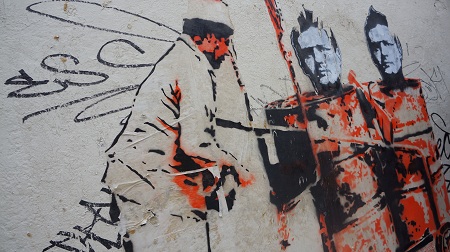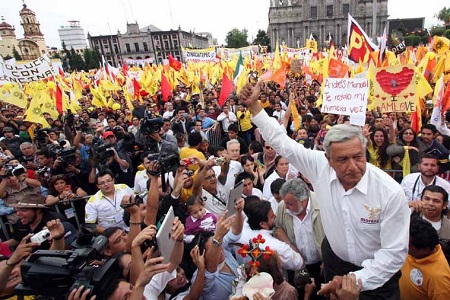I have been in Oaxaca this weekend (and will be so until Tuesday of the following week — when Québec votes!) and I wanted to share just a little about what I’ve seen here, and how it colors my perception of Mexican politics. ![]()
Oaxaca is the capital of Oaxaca state, which is by and large a student-heavy city (so lots of supporters of the #YoSoy132 movement in opposition to president-elect Enrique Peña Nieto of the Partido Revolucionario Institucional (PRI) ) in a state that already traditionally supports the Partido de la Revolución Democrática (PRD), and its candidate for president in the July 1 election, Andrés Manuel López Obrador. It is also the capital of state that is the most indigenous in all of México– with Zapotec, Mixtec, Mazatec, Chinantec and myriad other groups calling the region their home. It is the home of México’s sole indigenous president, Benito Juárez, a central figure of 19th century Mexican history.
The backstory is that Oaxaca was the site of a fierce — and deadly — fight between police forces and the Asamblea Popular de los Pueblos de Oaxaca (APPO, or the Popular Assembly of the Peoples of Oaxaca), which emerged after the tense showdown between authorities and a teachers’ union during a strike in Oaxaca in May 2006. Brutal force by the police during that strike escalated the incident into a full-fledged battle that left Oaxaca, essentially, with a reputation as the Chiapas of the 2000s. Although the governor at the time, Ulises Ruiz, a PRI governor, left office in 2010, his successor is the PRD-backed Gabino Cué, the first non-PRI governor of Oaxaca in over 80 years, and peace has, more or less, returned to the beautiful city 5,000 meters above sea level.
Nonetheless, and despite the ruling of México’s highest election court that Peña Nieto, has indeed won the election, despite accusations of unfair play from the PRD, I have been struck by the expressions of anti-Peña Nieto grafitti everywhere (see above, and see below, with Carlos Salinas, former PRI president from 1988-1994, ummm, popping out of Peña Nieto’s brain:
And here is Mexico’s president-elect being portrayed as garbage:
It’s understandable that there’s a certain segment of Oaxaca’s population that is significantly opposed to Peña Nieto, given the authoritarian background of the PRI when it was in power for seven decades from 1929 to 2000, but it’s striking that there’s been so little, just two months after the election, in the way of support of López Obrador or of opposition to the current, outgoing Mexican president, Felipe Calderón, whose Partido Acción Nacional (PAN) has held the presidency for the past 12 years.
None of this is to rule out the potential of a Peña Nieto presidency, but it’s a clear signal that he has yet to convince many segments of México’s vast population that he has their interests at heart.
Photo credit to Kevin Lees — Oaxaca, Mexico, September 2012.





